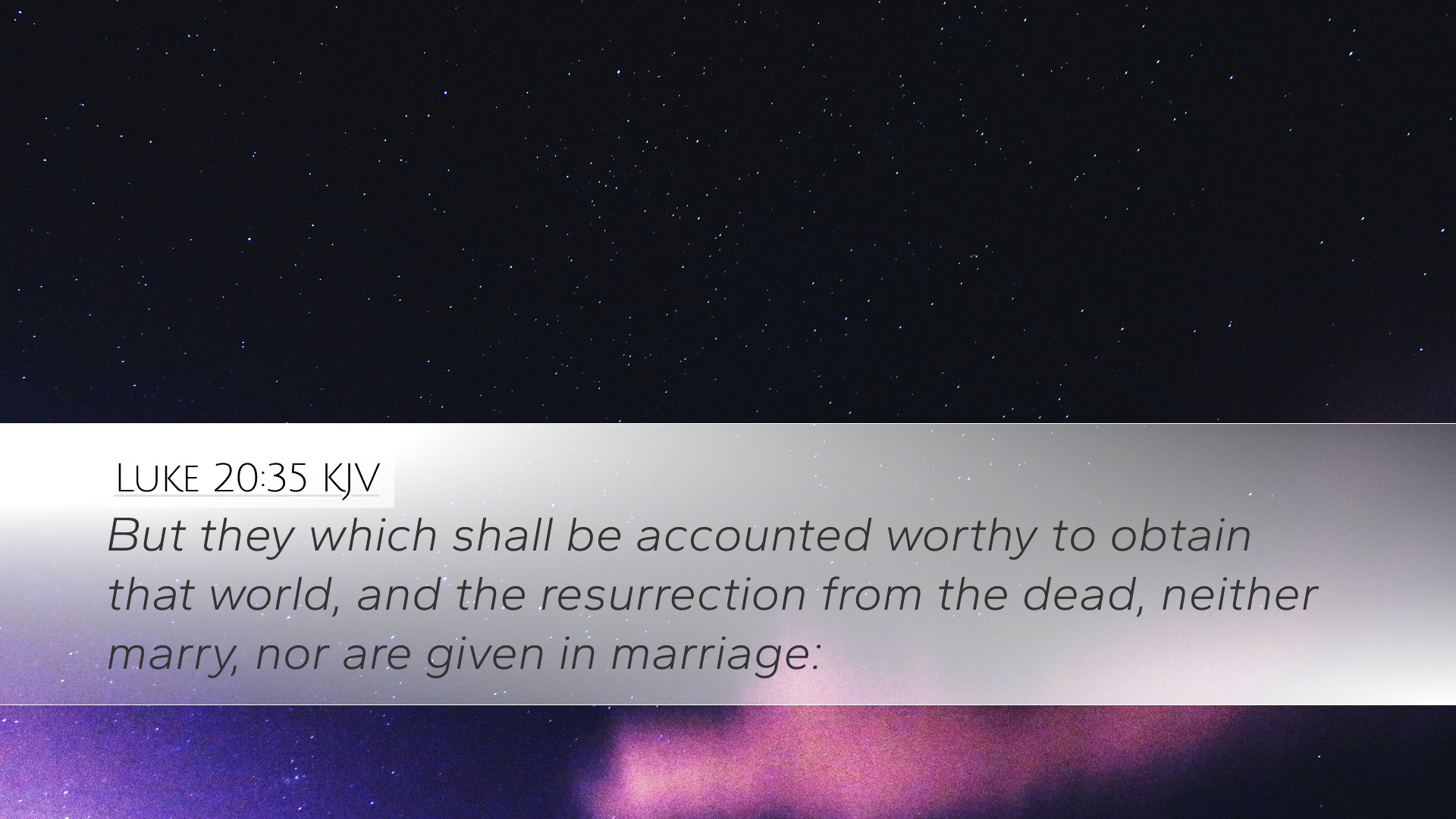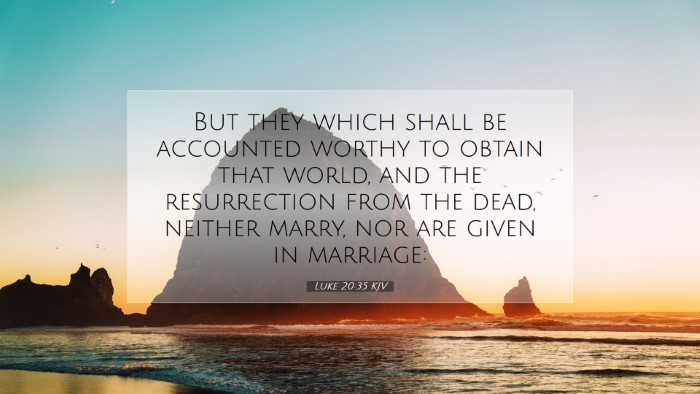Commentary on Luke 20:35
In Luke 20:35, Jesus articulates a profound truth regarding the afterlife, specifically speaking of those who are “accounted worthy” to obtain that age and the resurrection. This verse comes amidst a conversation with the Sadducees, a group that denied the resurrection. Through this commentary, we will explore the interpretations and insights from esteemed public domain commentators including Matthew Henry, Albert Barnes, and Adam Clarke.
Context and Background
Before diving into the specifics of verse 35, it is essential to understand its context. The Sadducees approached Jesus with a question intended to ridicule the doctrine of resurrection. They presented a hypothetical scenario involving a woman who marries seven brothers, each of whom dies without leaving offspring. Their question culminates in the inquiry of whose wife she will be in the resurrection. Jesus’ response seeks to expose the ignorance of the Sadducees regarding both the Scriptures and the power of God (Luke 20:34).
Exegesis of Luke 20:35
The verse reads: “But they which shall be accounted worthy to obtain that world, and the resurrection from the dead, neither marry, nor are given in marriage.” The richness of this verse can be unpacked through various theological perspectives:
-
Understanding Worthiness:
Jesus mentions those who will be “accounted worthy” to obtain eternal life. Matthew Henry comments on this significance by noting that worthiness is not a matter of personal merit but of divine grace and election. This reflects the biblical principle that those who desire to be part of God’s eternal kingdom must respond to His calling and live in accordance with His will.
-
The Nature of the Resurrection:
Albert Barnes emphasizes that the resurrection transforms our existence. In this life, marriage serves a vital role—establishing families and ensuring the continuation of generations. However, the state of the resurrected existence is qualitatively different, characterized by purity and direct communion with God. Thus, the institutions of this life do not carry over into the age to come.
-
Comparison with Earthly Life:
Adam Clarke further elaborates, stating that the earthly relationships and institutions will fade away in the resurrection. Jesus highlights that in heaven, there will be no marriages, as the redeemed will be “equal to the angels.” This comparison serves to show the elevated nature of eternal life, where relationships will transcend earthly limitations, focusing on spiritual unity rather than physical kinship.
Theological Implications
This single verse in Luke carries significant theological implications that merit deeper reflection:
-
Divine Grace and Assurance:
The notion of being “accounted worthy” can instill both humility and confidence within believers. They are reminded that their standing before God hinges on His grace rather than their deeds, as indicated by Henry. This encourages a life of faith, trust, and reliance on God’s provision for worthiness.
-
Hope in the Resurrection:
Jesus’ teaching on resurrection is critical for Christians, providing hope beyond the grave. The assurance of eternal life reassures believers that earthly struggles and relationships lead to a greater fulfillment in the presence of God.
-
Nature of the Afterlife:
This verse challenges common perceptions of the afterlife and encourages believers to ponder the nature of their existence in eternity. The comparison with angels suggests a realm of existence that transcends human experiences and limitations. Clarke underscores that believers should focus on a spiritual relationship with God rather than earthly paradigms of relationships.
Practical Applications
The insights drawn from Luke 20:35 lead to several practical applications for pastors, students, and theologians:
-
Teaching on Resurrection:
Pastors should emphasize the doctrine of resurrection in their teachings, equipping congregations with the hope and assurance derived from Christ's victory over death.
-
Encouraging Grace-Fueled Living:
Church leaders can encourage believers to live lives reflective of God's grace. The assurance of "worthiness" can motivate believers to pursue holiness and community in their earthly lives, drawing souls to Christ.
-
Fostering Spiritual Readiness:
As those who anticipate the resurrection, believers should focus on becoming worthy through spiritual discipline, prayer, and study of the Word, cultivating a deeper relationship with God.
Conclusion
Luke 20:35 encapsulates a critical teaching of Jesus concerning existence after death. By examining this verse through the lens of respected public domain commentaries, we find a rich tapestry of insights about worthiness, the nature of the resurrection, and the implications for contemporary Christian living. Understanding these truths can greatly affect our theology, our approach to ministry, and ultimately our hope for the future.


